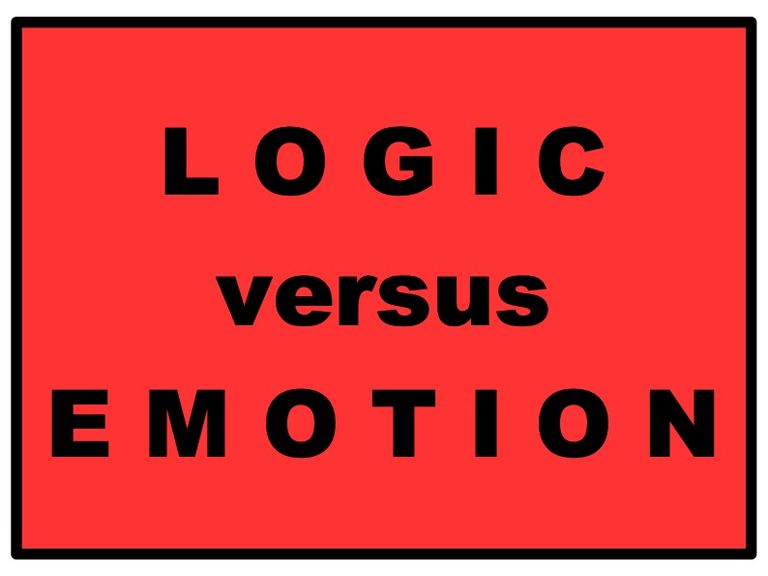
Recently, on youtube: Watch emotional expression towards rational logic.
User A:
'No-fault divorce has been a cancer on this country.'
User B (me):
'Just like everyone wants to make exceptions to the rules. And then to rename these exceptions as a ‘right’. "Funnily" enough, I know of nobody who divorced without fault. There is no such thing. If "no fault" would be the reason for divorcing, then no divorce would take place in the first place. So, it's a paradox. HaHa! God bless you.'
User C towards User B (me):
'Did you really just give yourself a pat on the back for that absolute word salad gibberish?'
User D towards User C:
'This was pretty coherent logical argument combined with a little bit word-play.'
User E:
'people will just lie about it then.'
User A towards User E:
'Then we investigate their claims and if it's found out they lied they get nothing.'
User C towards User D:
'Just like everyone wants to make exceptions to the rules' '
'- Useless nonsense platitude that means nothing and is none specific to anything.'
'And then to rename these exceptions as a 'right''
'- Expanded on the useless generic platitude as a foundation for a coherent argument, along with a non sequitur strawman assumption.'
'I known nobody who divorced without fault'
'- Uses some useless personal anecdote as if it's a relevant observation towards the larger generalisation being stated, with some mild word play.'
'If no fault would be the reason for divorcing, then no divorce would exist in the first place'
'- completely denies the existence of malicious divorce intention, or the weaponisation of divorce in a legal system that has obvious examples of it being used this way, hence prenups existing.
If you think that is a logically coherent argument towards anything, you're cooked. And your reading comprehension is lower than you think it is.'
User D towards User C:
Just like everyone wants to make exceptions to the rule
- In this case he referring to the fact that when the argument come up about divorces a lot of people argue from the extreme. Aka, "What if one of them try to unalive the other?" or "What if one of them abuse their's child?" etc. etc.
And then to rename these exceptions as a "right"
- Within the context of the text this means people use this extreme examples (referring to the argument from before) and make rules and rights based upon them and by this establishing rights based on extreme examples.
I know nobody who divorced without "fault"
This is not an anecdote, this is more a general observation. No one divorce for no reason, and if a reason exist someone is in fault (most of the time both side), ergo "no fault divorce" don't make sense. This is not a personal anecdote, it is more rethoric flourish.
As you can see this is pretty coherent and logical argument. The only thing is that it is not explicit and force the reader to actually understand the text by observing the context it is written in.
User C towards User D:
'You do realise that nothing of what you typed is logically coherent?
and just saying 'nuh uh' to something doesn't stop it from being true.
No fault divorce exists, it gets weaponised and is legislation that is actively contributing to destroying the familial unit.
How you want to come up with some semantic nonsense just to dance in your own flowery language and feelings to claim otherwise is beyond me.'
User D towards User C:
'Yes, this is the point. We argued thet the term "no fault" divorce is nonsense, by this we inplicitly argued thet it's should not exist. We are agreeing with you.'
User B (me) towards User C:
We all agree here.
There are rules. These are: Do not lie, do not cheat, do not kill. Usually people agree to these principles. Correct? If it is the case that in a marriage one of the two harms the other (or as stated above, abuses the child) - divorce would be the exception to marriage existing as an important institution.
This breach of the rules is generally recognised as ‘being at fault’. So if there are serious grounds for divorce, it is because one or both of them have been at fault. Without a conflict, there would be no separation. Correct?
Separation should rather be the exception, not the rule, is how I think.
But if no-fault divorce is the rule and staying married is the exception, things are upside down.
Since people have usually a conflict with each other when they separate, this no-fault divorce is both an inappropriate word and out of touch with reality. Personally, I find it downright ridiculous.
Of course, every rule needs an exception, otherwise it would not be a rule but a dictate (inflexible and rigid). You can't force married couples to stay together, so there have to be exceptions, right?
Nowadays, people marry without knowing why and ‘no-fault divorce’ is a convenient backdoor that creates the illusion that married people separate peacefully. But they don't.
What you seem to mean is that married couples separate just like that and yes, I agree. If they get married just like that, it is logical that they separate just like that. But neither of them care much and they haven't even begun to understand or take the institution of marriage and family seriously. That's why I have added to the original comment ‘... is cancer’ and my comment revealed that the term 'no fault' is nonsensical - paradoxical.
It only makes sense to those who, because they are immature, seem to believe that ‘without fault’ is synonymous with ‘peaceful’. They do not realise that it is synonymous with ‘meaningless’.
User B (me) towards User D:
'Excellently argued. That's what I meant. Rarely have I seen someone interpret so precisely what I presented in a few short sentences. Chapeaux.'